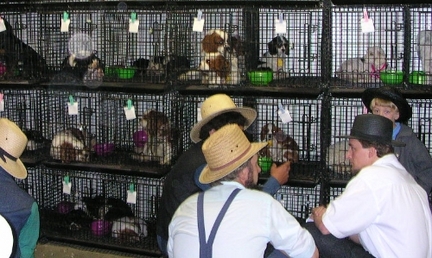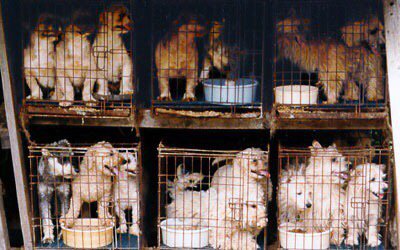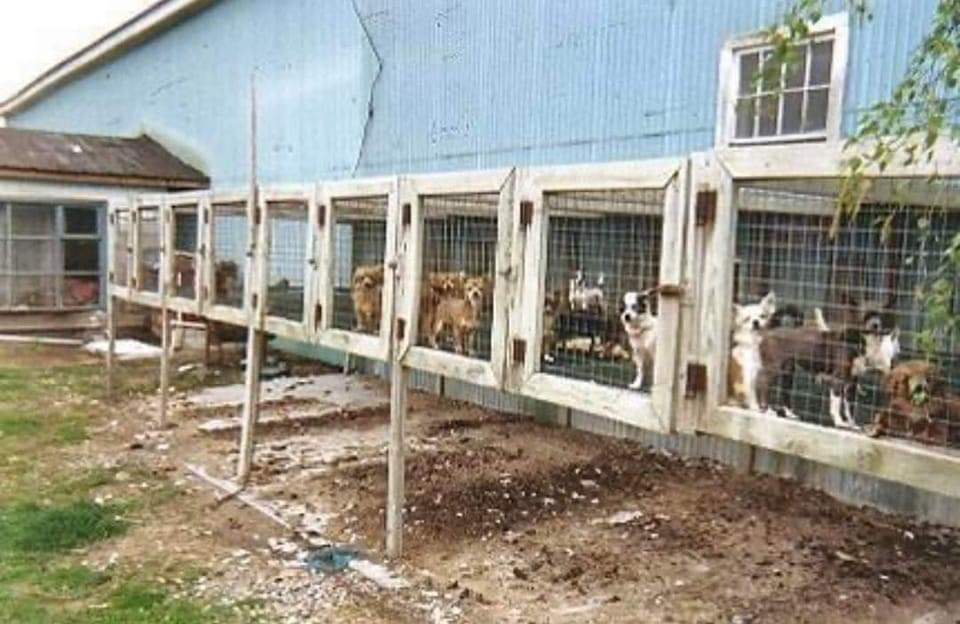The Amish community, known for their simple living and traditional values, has a lesser-known side that involves the operation of puppy mills. These facilities, often hidden from the public eye, are breeding grounds for dogs under harsh and inhumane conditions. This piece aims to shed light on the realities of Amish puppy mills, exploring how breeding dogs are treated, the conditions within these facilities, the methods used to sell these puppies, and what you can do to help combat this issue.
How do The Amish Treat Their Breeding Dogs?

The Amish treat their breeding dogs primarily as livestock rather than pets, focusing on the economic value the animals can bring rather than their well-being. Many of these breeding dogs live in confined spaces, often in small, cramped cages with little room to move. They receive minimal social interaction, exercise, or veterinary care, leading to a life of isolation and neglect. The dogs are frequently subjected to repeated breeding cycles with little to no recovery time between litters, causing significant physical and psychological stress. The lack of proper hygiene and medical attention further exacerbates their suffering, resulting in a life of continuous hardship. In many cases, the dogs are not given adequate food or clean water, and the unsanitary conditions can lead to various health issues, including infections and diseases.
This cruel treatment highlights the stark contrast between the Amish’s outward appearance of simplicity and the hidden reality of their puppy mills.
What Happens to the Dogs After They Can No Longer Breed?
Once the breeding dogs are no longer able to produce puppies, their fate is often grim. Many of these dogs are disposed of in inhumane ways, such as being abandoned, euthanized, or sold at auctions where they may end up in other breeding facilities or worse. Some may be left to die from neglect or poor health, as the breeders no longer see them as valuable. The fortunate few that are rescued by animal welfare organizations often require extensive medical and psychological rehabilitation due to the years of abuse and neglect they have suffered. This tragic end underscores the urgent need for stricter regulations and greater awareness to protect these animals from such cruel practices.
What Are the Conditions in These Puppy Mills?
Puppy mills, including those operated by the Amish, are notorious for their deplorable conditions. These facilities prioritize profit over the well-being of the animals, leading to environments that are often overcrowded, unsanitary, and inhumane. The following sections will delve into the various hardships faced by dogs in these mills, from insufficient veterinary care to the heartbreak of puppies being taken from their mothers too soon. Understanding these conditions is crucial for raising awareness and advocating for the welfare of these animals.
Overcrowding
Overcrowding in puppy mills is a significant issue, with many dogs confined to squalid, small cages that offer little to no space for movement. These cages are often stacked on top of each other, leading to further distress as waste falls from the upper cages onto the dogs below. The animals are provided with minimal protection from extreme weather conditions, enduring freezing cold in the winter and sweltering heat in the summer. Furthermore, the lack of proper sanitation means that the dogs frequently have to sit and sleep in their own feces, which can lead to severe health problems and infections. This overcrowded and unhygienic environment exacerbates the physical and psychological suffering of the dogs, emphasizing the urgent need for intervention and reform in these facilities.
Little To No Veterinary Care
Dogs in puppy mills, including those run by the Amish, receive very little to no veterinary care, which severely impacts their health and wellbeing. These animals often suffer from untreated injuries and illnesses, as breeders typically avoid the costs associated with proper medical treatment. Common health issues include dental diseases, skin infections, respiratory conditions, and untreated wounds. The lack of regular check-ups and vaccinations leaves the dogs vulnerable to infections and diseases, which can spread rapidly in the overcrowded and unsanitary conditions of the mills. This neglect not only causes immense suffering but can also lead to premature death for many of these animals.
Puppies Taken From Their Parents
Puppies in Amish puppy mills are often taken from their mothers at extremely early ages, sometimes as young as four to six weeks old. This premature separation deprives the puppies of essential maternal care, including vital nutrients from their mother’s milk and the socialization skills that come from being with their littermates. The early removal can lead to numerous developmental and health issues, such as weakened immune systems, behavioral problems, and difficulty in forming bonds with humans and other animals. This practice is driven by the breeders’ desire to maximize profit by selling the puppies as quickly as possible, without regard for the well-being and proper development of the young dogs.
Malnutrition and Starvation
Dogs and puppies in Amish puppy mills frequently suffer from malnutrition and starvation due to inadequate or unsanitary food and water. The breeders often provide minimal food that lacks essential nutrients, leading to severe health issues such as stunted growth, weakened immune systems, and chronic illnesses. Additionally, the water given to the animals is often contaminated and unclean, exacerbating their poor health conditions. The lack of proper nutrition and hydration not only causes physical suffering but also contributes to a weakened state that makes the dogs more susceptible to diseases and infections, further diminishing their chances of survival and well-being.

The Dogs are Overbred
The dogs in Amish puppy mills are often overbred, meaning they are forced to produce litter after litter with little to no recovery time between pregnancies. This relentless cycle of breeding takes a severe toll on the physical and mental health of the mother dogs. Over time, the constant strain of pregnancy and nursing weakens their bodies, leading to chronic health issues such as uterine infections, mastitis, and overall physical exhaustion. Additionally, the lack of proper veterinary care exacerbates these conditions, leaving the dogs to suffer in silence. The overbreeding practices further highlight the inhumane treatment these animals endure and underscore the need for stricter regulations and oversight to protect them.
How do They Sell These Puppies?
Puppies from Amish puppy mills are often sold through various channels that mask the true origins of these animals. Many are sold directly to pet stores, where unsuspecting customers purchase them without knowing their background. Additionally, some breeders use online platforms and classified ads to market the puppies, presenting them as coming from reputable sources. Puppy auctions are another common method, where breeders sell dogs to the highest bidder, often without any health guarantees or proper documentation. These sales tactics enable the continued operation of puppy mills by keeping the buyers in the dark about the harsh conditions and unethical practices behind the scenes.
How You Can Help
Combating the cruel practices of puppy mills, including those within the Amish community, requires a multi-faceted approach. By becoming informed, adopting rescue animals, supporting local shelters, and spreading awareness, you can play a vital role in addressing this pressing issue. The following sections outline practical steps you can take to help put an end to the suffering of dogs in these inhumane breeding facilities.
Be Informed and Responsible
When deciding to purchase a dog from a breeder, it is crucial to thoroughly research and understand the breeder’s practices to ensure you are not inadvertently supporting inhumane puppy mills. Reputable breeders are transparent about their breeding methods, provide proper veterinary care, and maintain clean, healthy environments for their animals. They should be willing to answer questions about the parents’ health, the puppy’s early life, and offer opportunities to visit their facilities. Additionally, responsible breeders often have waiting lists and do not have puppies available at all times, as they prioritize the well-being of their dogs over profit. By being informed and diligent in your research, you can make ethical choices that support humane breeding practices and contribute to the overall welfare of dogs.
Adopt Instead of Purchasing From a Breeder
One significant way to help combat the issue of puppy mills is by choosing to adopt a dog from an animal shelter or rescue organization instead of purchasing from a breeder. Shelters are filled with dogs of all ages, breeds, and sizes that are in desperate need of loving homes. By adopting, you not only provide a second chance to a dog in need but also reduce the demand for puppies bred in inhumane conditions. Adoption fees typically cover essential veterinary care, such as vaccinations and spaying or neutering, ensuring that you take home a healthy pet. Moreover, adopting from a shelter supports organizations that work tirelessly to rescue and rehabilitate animals, contributing to the overall effort to end the cruel practices associated with puppy mills.
Donate To your Local Shelter
Donating to your local animal shelter can have a profound impact on the lives of countless animals in need. These shelters rely heavily on donations to provide essential services such as veterinary care, food, and shelter for abandoned, abused, or neglected animals. Your contributions help fund medical treatments, spaying and neutering programs, and the daily care required to ensure these animals can lead healthy, happy lives. Additionally, donations support the shelter’s efforts in rescuing animals from inhumane conditions, including puppy mills, and aid in their rehabilitation and adoption processes. By donating, you are directly contributing to the welfare of these animals and supporting the shelter’s mission to create a safer and more compassionate community for all pets.
Be Educated on the Topic of Puppy Mills
Being educated about puppy mills and the cruelty involved in them is another powerful way you can help. By understanding the harsh realities of these operations, you can make informed decisions and spread awareness to others. Knowledge about the inhumane conditions, unethical breeding practices, and the severe neglect that the dogs endure empowers you to advocate for stricter regulations and support initiatives aimed at shutting down these mills. Educating yourself and others can also deter people from unknowingly purchasing puppies from these sources, thereby reducing the demand for dogs bred in such environments. Through education, you can play a crucial role in driving change and promoting the humane treatment of all animals.

At Wounded Paw Project, we are dedicated to putting an end to the cruel practices of puppy mills, including those within the Amish community. Our efforts focus on rescuing and rehabilitating dogs that have suffered from inhumane breeding conditions, advocating for stricter regulations, and spreading awareness about the realities of these operations. Your support and donations play a crucial role in our mission. By contributing to Wounded Paw Project, you help fund essential medical treatments, rescue operations, and ongoing advocacy efforts. Together, we can make a difference in the lives of countless animals and work towards a future where all dogs are treated with the compassion and respect they deserve.
